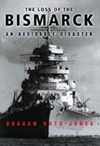The Loss of the Bismarck
An Avoidable Disaster
Rhys-Jones, Graham
1999, United States Naval Inst.
ISBN 1557505330
256 pages
| Type. | General History |
| Pros. | Steady, concise, thorough research and analysis; dismisses all the conjecture and disarms any other possibilities for authors to create or enlarge ideas out of proportion |
| Cons. | Perhaps not readable enough. A bit limited in its origins as a series of lectures: would have been better if longer and even more detailed |
| Rating. |  |
 Intended as an analysis of German Naval strategy, Rhys-Jones' account is thus openly biased away from a personal, general or operational viewpoint. Nonetheless he achieves a fair balance between them, if not up to the standard of Pursuit. His style is easy and consistent without being flippant or pompous. The only detracting element is the obvious origin of the text in a series of lecture notes, with every chapter being overly self-contained and concerned with proving one point at a time. This he makes full apology for in the introduction. Rhys-Jones gives enough of the ongoing story to create a workmanlike narrative while always subsuming this to his overall theme of the obsolescence of German naval strategy through surface commerce raiding. Earlier operations from Graf Spee onwards are also examined, but as backdrop and preparation for Exercise Rhein. Lütjens' own command of Scharnhorst and Gneisenau in early 1941 are used as a special case in point. There were already too many limitations on the use of large, expensive, thirsty naval assets even in the wide Atlantic.
Intended as an analysis of German Naval strategy, Rhys-Jones' account is thus openly biased away from a personal, general or operational viewpoint. Nonetheless he achieves a fair balance between them, if not up to the standard of Pursuit. His style is easy and consistent without being flippant or pompous. The only detracting element is the obvious origin of the text in a series of lecture notes, with every chapter being overly self-contained and concerned with proving one point at a time. This he makes full apology for in the introduction. Rhys-Jones gives enough of the ongoing story to create a workmanlike narrative while always subsuming this to his overall theme of the obsolescence of German naval strategy through surface commerce raiding. Earlier operations from Graf Spee onwards are also examined, but as backdrop and preparation for Exercise Rhein. Lütjens' own command of Scharnhorst and Gneisenau in early 1941 are used as a special case in point. There were already too many limitations on the use of large, expensive, thirsty naval assets even in the wide Atlantic.
His maps and photographs are also a welcome addition to depictions of the operation, including those of previously neglected men, aircraft and vessels, and giving courses and positions subjected to deeper and more searching analysis than in any previous work. These clarify rather than contradict those of earlier works, and furthermore give unequivocal support for the intelligence the various personnel had, and why their decisions were taken. Indeed the overriding theme of Rhys-Jones' work is not to debunk or detract from existing primary or secondary sources, but to simply reanalyse the operation in order to remove as many lingering doubts and questions about the decisions taken and the other options the participants had.
What we are left with then is not a radically reinterpreted new picture of the struggle, but a finely balanced, meticulously researched account of why everyone acted as they did, why they could not have acted differently, given what they were using and knew, and thus why conjectures and 'what-ifs' cannot account for other outcomes. That it really could not have come out any other way may seem a poor reason to write yet another book on the subject, but it has all the benefits of playing with conjectural history while removing for the last time almost all of the questions, and removing almost all the supports for future efforts to prove or disprove pet theories or enhancing minor points out of proportion.
The overall German method of running such exercises is shown to be flawed (as earlier operations demonstrated when subjected to the same analysis). Furthermore the rigidity and personality of the commanders, especially Lütjens, is paramount to explaining and supporting the decisions and the mistakes made. Given the limitations of his vessels, and his own personal and professional parameters, Lütjens backed himself into a corner, deciding very early that the operation was compromised and unsafe, and compounding this with insecure and ill-advised use of his radio, which the burgeoning Allied DF stations took full advantage of. This is not to say that the loss of Bismarck was entirely Lütjens' fault, nor that British victory did not contain a fair amount of luck. There were a host of interconnecting factors leading to her sinking. That Rhys-Jones has only confirmed the conclusions of historians and officers of half a century ago is also no failure. We have only grown complacent about new generations of authors upsetting and rewriting the decided views of their forebears.
The reviewer welcomes your comments on this review.
Review written by Ian Campbell.
Published on 16 Mar 2001.
Purchase information: (info) Get The Loss of the Bismarck now at amazon.co.uk
Get The Loss of the Bismarck now at amazon.co.uk
Return to our main review page.



